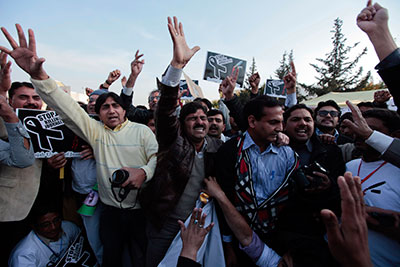Owais Toheed, head of ARY News, cancelled his speaking slot for Wednesday at the conference I’m attending in Islamabad. Organized by UNESCO, the Open Society Foundations, Intermedia, and International Media Support, the meeting’s title says it all: International Conference on Safety and Security of Journalists in Pakistan. The reason Toheed couldn’t attend is because he was tearing toward Hyderabad, where one of ARY’s investigative camera crews was attacked earlier today.
It was a big crew–apparently seven or eight, including the driver. But they were heavily outnumbered by the thugs who didn’t want them around. Two of the crew’s members were wounded by gunfire and others badly beaten when they tried to start taping in a neighborhood of Hyderabad notorious for trafficking in drugs and women.
From his car as he was driving, Toheed told me he believes the two men shot will be ok, that their wounds aren’t fatal. While I was speaking with him I was watching ARY’s coverage of the incident–the crew had kept rolling through much of the attack.
Gutsy camera crews, go-get-’em producers and correspondents, and a competitive on-air culture compound the danger of working in Pakistan, and not just for those in television. Of the first three reporters to die in Pakistan this year–all in a car bomb in Baluchistan–two were a Samaa TV crew and the other a photographer. Two other journalists, both from print, were recently killed: Malik Mumtaz in the Federally Administrated Tribal Areas and Mehmood Jan Afridi in Baluchistan. Maybe coincidentally, maybe not, both men had recently been elected president of their local press clubs.
With conflicting information and no police investigation, it’s hard to make the call whether journalists were targeted for their work or for some other reason. I’ve spent the last day talking with journalists here about possible motives in the cases, but so far no one has a clear understanding. CPJ’s fatality figures tend to run lower than other groups’ because we only count those who we can confirm were killed because of their journalism. When the motive in a death is unclear, we list the victim as “unconfirmed.”
Toheed said he wanted to get to Hyderabad as quickly as possible to talk with police about the First Incident Report (FIR) that will be filed for the attack on his crew. There are plenty of eyewitness and video evidence to identify the attackers, although there will be no forensics–as is usual in Pakistan. The police chief from the area said he suspended some officers who had witnessed the scene; there are conflicting stories that they just stood by, or that some might have been involved in the brawl on the side of the locals. Most of the time, the police round up anyone they think might have seen something, take their statements, and do the paperwork. But if this case runs true to form, and there is no reason to believe it won’t, there will be few if any arrests, no prosecutions, most likely not even a trial, let alone any convictions. There simply has been no one found guilty in any of the targeted or indirect killings of journalists in the past 10 years. None.
The good thing about the Islamabad conference is that, while organized by a U.N. organization and NGOs, working journalists will lead many of the discussions. Over the years many of them, and I, have become convinced that the government is either unwilling or unable to provide Pakistan’s press with the safety and security they need. To some extent, the problem is being addressed. Journalists in most regions have been given safety courses, first aid training, and some small amount of financial assistance to help build stronger institutions. There seems to be a mixed attitude among field journalists toward protective gear, but it most likely would be a good idea to start making it as widely available as possible. A lot of the wealthier news organizations already do.
No one is dismissing the idea of pressing the government to address the problem through new legislation, or even acting on that already in place, but among the people I’ve been speaking with, the feeling is that journalists and their own professional organizations will have to be able to protect themselves rather than waiting for the government to do so.
All these considerations are sure to fill the two days of discussions that lie ahead. And, who knows, maybe Toheed can make it back from Hyderabad to catch the tail end of the conference. And give us the freshest information from the field.
[Reporting from Islamabad]
